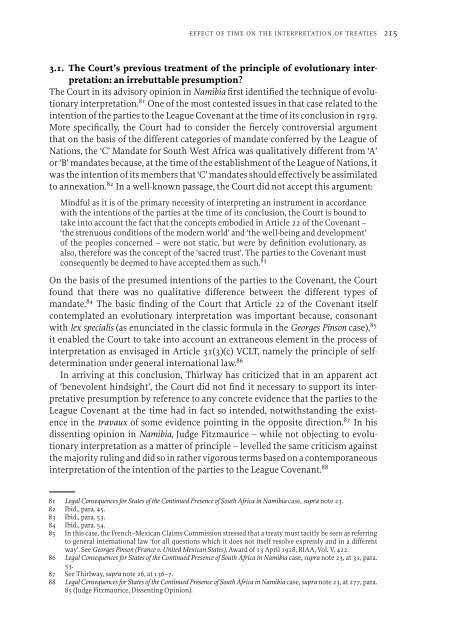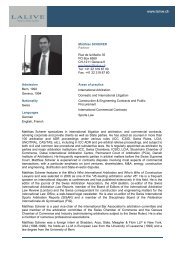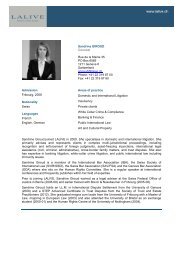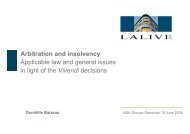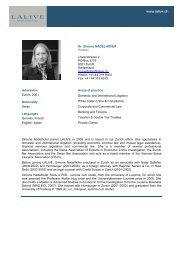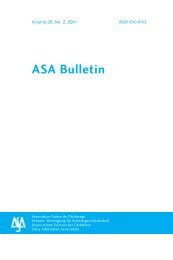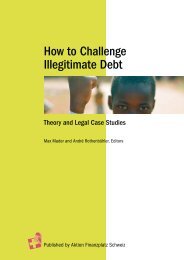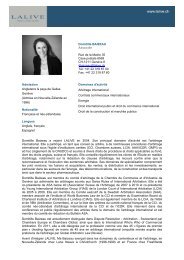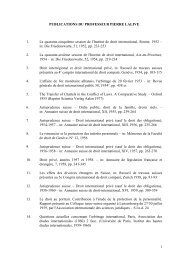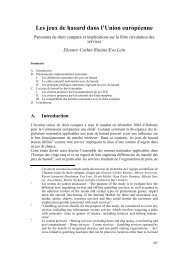The Effect of the Passage of Time on the Interpretation of Treaties ...
The Effect of the Passage of Time on the Interpretation of Treaties ...
The Effect of the Passage of Time on the Interpretation of Treaties ...
Create successful ePaper yourself
Turn your PDF publications into a flip-book with our unique Google optimized e-Paper software.
EFFECT OF TIME ON THE INTERPRETATION OF TREATIES 215<br />
3.1. <str<strong>on</strong>g>The</str<strong>on</strong>g> Court’s previous treatment <str<strong>on</strong>g>of</str<strong>on</strong>g> <str<strong>on</strong>g>the</str<strong>on</strong>g> principle <str<strong>on</strong>g>of</str<strong>on</strong>g> evoluti<strong>on</strong>ary interpretati<strong>on</strong>:<br />
an irrebuttable presumpti<strong>on</strong>?<br />
<str<strong>on</strong>g>The</str<strong>on</strong>g> Court in its advisory opini<strong>on</strong> in Namibia first identified <str<strong>on</strong>g>the</str<strong>on</strong>g> technique <str<strong>on</strong>g>of</str<strong>on</strong>g> evoluti<strong>on</strong>ary<br />
interpretati<strong>on</strong>. 81 One <str<strong>on</strong>g>of</str<strong>on</strong>g> <str<strong>on</strong>g>the</str<strong>on</strong>g> most c<strong>on</strong>tested issues in that case related to <str<strong>on</strong>g>the</str<strong>on</strong>g><br />
intenti<strong>on</strong> <str<strong>on</strong>g>of</str<strong>on</strong>g> <str<strong>on</strong>g>the</str<strong>on</strong>g> parties to <str<strong>on</strong>g>the</str<strong>on</strong>g> League Covenant at <str<strong>on</strong>g>the</str<strong>on</strong>g> time <str<strong>on</strong>g>of</str<strong>on</strong>g> its c<strong>on</strong>clusi<strong>on</strong> in 1919.<br />
More specifically, <str<strong>on</strong>g>the</str<strong>on</strong>g> Court had to c<strong>on</strong>sider <str<strong>on</strong>g>the</str<strong>on</strong>g> fiercely c<strong>on</strong>troversial argument<br />
that <strong>on</strong> <str<strong>on</strong>g>the</str<strong>on</strong>g> basis <str<strong>on</strong>g>of</str<strong>on</strong>g> <str<strong>on</strong>g>the</str<strong>on</strong>g> different categories <str<strong>on</strong>g>of</str<strong>on</strong>g> mandate c<strong>on</strong>ferred by <str<strong>on</strong>g>the</str<strong>on</strong>g> League <str<strong>on</strong>g>of</str<strong>on</strong>g><br />
Nati<strong>on</strong>s, <str<strong>on</strong>g>the</str<strong>on</strong>g> ‘C’ Mandate for South West Africa was qualitatively different from ‘A’<br />
or ‘B’ mandates because, at <str<strong>on</strong>g>the</str<strong>on</strong>g> time <str<strong>on</strong>g>of</str<strong>on</strong>g> <str<strong>on</strong>g>the</str<strong>on</strong>g> establishment <str<strong>on</strong>g>of</str<strong>on</strong>g> <str<strong>on</strong>g>the</str<strong>on</strong>g> League <str<strong>on</strong>g>of</str<strong>on</strong>g> Nati<strong>on</strong>s, it<br />
was <str<strong>on</strong>g>the</str<strong>on</strong>g> intenti<strong>on</strong> <str<strong>on</strong>g>of</str<strong>on</strong>g> its members that ‘C’ mandates should effectively be assimilated<br />
to annexati<strong>on</strong>. 82 In a well-known passage, <str<strong>on</strong>g>the</str<strong>on</strong>g> Court did not accept this argument:<br />
Mindful as it is <str<strong>on</strong>g>of</str<strong>on</strong>g> <str<strong>on</strong>g>the</str<strong>on</strong>g> primary necessity <str<strong>on</strong>g>of</str<strong>on</strong>g> interpreting an instrument in accordance<br />
with <str<strong>on</strong>g>the</str<strong>on</strong>g> intenti<strong>on</strong>s <str<strong>on</strong>g>of</str<strong>on</strong>g> <str<strong>on</strong>g>the</str<strong>on</strong>g> parties at <str<strong>on</strong>g>the</str<strong>on</strong>g> time <str<strong>on</strong>g>of</str<strong>on</strong>g> its c<strong>on</strong>clusi<strong>on</strong>, <str<strong>on</strong>g>the</str<strong>on</strong>g> Court is bound to<br />
take into account <str<strong>on</strong>g>the</str<strong>on</strong>g> fact that <str<strong>on</strong>g>the</str<strong>on</strong>g> c<strong>on</strong>cepts embodied in Article 22 <str<strong>on</strong>g>of</str<strong>on</strong>g> <str<strong>on</strong>g>the</str<strong>on</strong>g> Covenant –<br />
‘<str<strong>on</strong>g>the</str<strong>on</strong>g> strenuous c<strong>on</strong>diti<strong>on</strong>s <str<strong>on</strong>g>of</str<strong>on</strong>g> <str<strong>on</strong>g>the</str<strong>on</strong>g> modern world’ and ‘<str<strong>on</strong>g>the</str<strong>on</strong>g> well-being and development’<br />
<str<strong>on</strong>g>of</str<strong>on</strong>g> <str<strong>on</strong>g>the</str<strong>on</strong>g> peoples c<strong>on</strong>cerned – were not static, but were by definiti<strong>on</strong> evoluti<strong>on</strong>ary, as<br />
also, <str<strong>on</strong>g>the</str<strong>on</strong>g>refore was <str<strong>on</strong>g>the</str<strong>on</strong>g> c<strong>on</strong>cept <str<strong>on</strong>g>of</str<strong>on</strong>g> <str<strong>on</strong>g>the</str<strong>on</strong>g> ‘sacred trust’. <str<strong>on</strong>g>The</str<strong>on</strong>g> parties to <str<strong>on</strong>g>the</str<strong>on</strong>g> Covenant must<br />
c<strong>on</strong>sequently be deemed to have accepted <str<strong>on</strong>g>the</str<strong>on</strong>g>m as such. 83<br />
On <str<strong>on</strong>g>the</str<strong>on</strong>g> basis <str<strong>on</strong>g>of</str<strong>on</strong>g> <str<strong>on</strong>g>the</str<strong>on</strong>g> presumed intenti<strong>on</strong>s <str<strong>on</strong>g>of</str<strong>on</strong>g> <str<strong>on</strong>g>the</str<strong>on</strong>g> parties to <str<strong>on</strong>g>the</str<strong>on</strong>g> Covenant, <str<strong>on</strong>g>the</str<strong>on</strong>g> Court<br />
found that <str<strong>on</strong>g>the</str<strong>on</strong>g>re was no qualitative difference between <str<strong>on</strong>g>the</str<strong>on</strong>g> different types <str<strong>on</strong>g>of</str<strong>on</strong>g><br />
mandate. 84 <str<strong>on</strong>g>The</str<strong>on</strong>g> basic finding <str<strong>on</strong>g>of</str<strong>on</strong>g> <str<strong>on</strong>g>the</str<strong>on</strong>g> Court that Article 22 <str<strong>on</strong>g>of</str<strong>on</strong>g> <str<strong>on</strong>g>the</str<strong>on</strong>g> Covenant itself<br />
c<strong>on</strong>templated an evoluti<strong>on</strong>ary interpretati<strong>on</strong> was important because, c<strong>on</strong>s<strong>on</strong>ant<br />
with lex specialis (as enunciated in <str<strong>on</strong>g>the</str<strong>on</strong>g> classic formula in <str<strong>on</strong>g>the</str<strong>on</strong>g> Georges Pins<strong>on</strong> case), 85<br />
it enabled <str<strong>on</strong>g>the</str<strong>on</strong>g> Court to take into account an extraneous element in <str<strong>on</strong>g>the</str<strong>on</strong>g> process <str<strong>on</strong>g>of</str<strong>on</strong>g><br />
interpretati<strong>on</strong> as envisaged in Article 31(3)(c) VCLT, namely <str<strong>on</strong>g>the</str<strong>on</strong>g> principle <str<strong>on</strong>g>of</str<strong>on</strong>g> selfdeterminati<strong>on</strong><br />
under general internati<strong>on</strong>al law. 86<br />
In arriving at this c<strong>on</strong>clusi<strong>on</strong>, Thirlway has criticized that in an apparent act<br />
<str<strong>on</strong>g>of</str<strong>on</strong>g> ‘benevolent hindsight’, <str<strong>on</strong>g>the</str<strong>on</strong>g> Court did not find it necessary to support its interpretative<br />
presumpti<strong>on</strong> by reference to any c<strong>on</strong>crete evidence that <str<strong>on</strong>g>the</str<strong>on</strong>g> parties to <str<strong>on</strong>g>the</str<strong>on</strong>g><br />
League Covenant at <str<strong>on</strong>g>the</str<strong>on</strong>g> time had in fact so intended, notwithstanding <str<strong>on</strong>g>the</str<strong>on</strong>g> existence<br />
in <str<strong>on</strong>g>the</str<strong>on</strong>g> travaux <str<strong>on</strong>g>of</str<strong>on</strong>g> some evidence pointing in <str<strong>on</strong>g>the</str<strong>on</strong>g> opposite directi<strong>on</strong>. 87 In his<br />
dissenting opini<strong>on</strong> in Namibia, Judge Fitzmaurice – while not objecting to evoluti<strong>on</strong>ary<br />
interpretati<strong>on</strong> as a matter <str<strong>on</strong>g>of</str<strong>on</strong>g> principle – levelled <str<strong>on</strong>g>the</str<strong>on</strong>g> same criticism against<br />
<str<strong>on</strong>g>the</str<strong>on</strong>g> majority ruling and did so in ra<str<strong>on</strong>g>the</str<strong>on</strong>g>r vigorous terms based <strong>on</strong> a c<strong>on</strong>temporaneous<br />
interpretati<strong>on</strong> <str<strong>on</strong>g>of</str<strong>on</strong>g> <str<strong>on</strong>g>the</str<strong>on</strong>g> intenti<strong>on</strong> <str<strong>on</strong>g>of</str<strong>on</strong>g> <str<strong>on</strong>g>the</str<strong>on</strong>g> parties to <str<strong>on</strong>g>the</str<strong>on</strong>g> League Covenant. 88<br />
81 Legal C<strong>on</strong>sequences for States <str<strong>on</strong>g>of</str<strong>on</strong>g> <str<strong>on</strong>g>the</str<strong>on</strong>g> C<strong>on</strong>tinued Presence <str<strong>on</strong>g>of</str<strong>on</strong>g> South Africa in Namibia case, supra note 23.<br />
82 Ibid., para. 45.<br />
83 Ibid., para. 53.<br />
84 Ibid., para. 54.<br />
85 In this case, <str<strong>on</strong>g>the</str<strong>on</strong>g> French–Mexican Claims Commissi<strong>on</strong> stressed that a treaty must tacitly be seen as referring<br />
to general internati<strong>on</strong>al law ‘for all questi<strong>on</strong>s which it does not itself resolve expressly and in a different<br />
way’. See Georges Pins<strong>on</strong> (France v. United Mexican States), Award <str<strong>on</strong>g>of</str<strong>on</strong>g> 13 April 1928, RIAA, Vol. V, 422.<br />
86 Legal C<strong>on</strong>sequences for States <str<strong>on</strong>g>of</str<strong>on</strong>g> <str<strong>on</strong>g>the</str<strong>on</strong>g> C<strong>on</strong>tinued Presence <str<strong>on</strong>g>of</str<strong>on</strong>g> South Africa in Namibia case, supra note 23, at 31, para.<br />
53.<br />
87 See Thirlway, supra note 26, at 136–7.<br />
88 Legal C<strong>on</strong>sequences for States <str<strong>on</strong>g>of</str<strong>on</strong>g> <str<strong>on</strong>g>the</str<strong>on</strong>g> C<strong>on</strong>tinued Presence <str<strong>on</strong>g>of</str<strong>on</strong>g> South Africa in Namibia case, supra note 23, at 277, para.<br />
85 (Judge Fitzmaurice, Dissenting Opini<strong>on</strong>).


